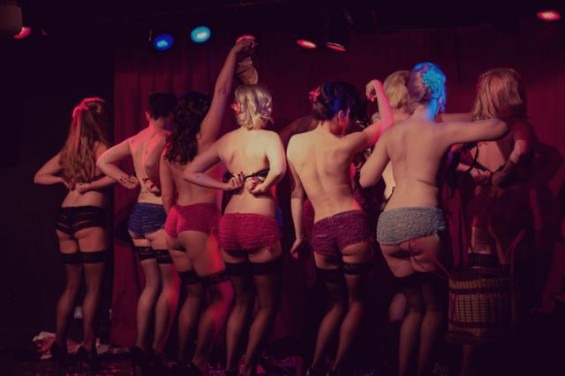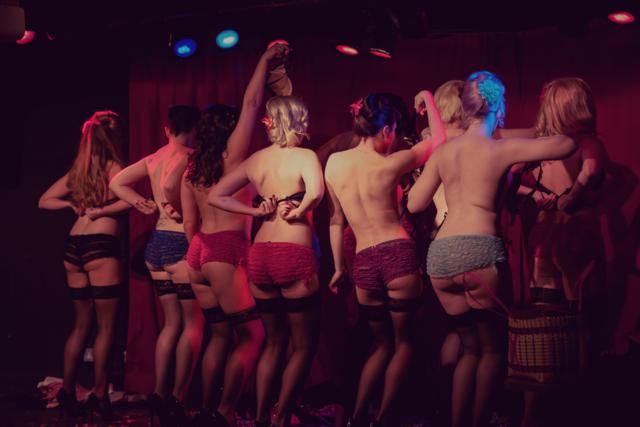Burlesque performers are increasingly being charged administration fees by festival promoters but do the sums add up?

“It’s not a performer’s job to subsidise your business.”
“I find it deeply suspect to be honest, no matter how high profile the event.”
“Usually it’s just a thinly veiled guise to pay for the venue. If you can’t afford to run a show, don’t run one.” *
Paying to perform or performing for exposure not money is a controversial topic. From large scale festivals to newcomers’ competitions, this kind of event is a reasonably common sight in burlesque and cabaret. But how to distinguish the opportunities of genuine benefit to the performers from the events looking for free attractions?
The London Burlesque Festival charge a fee to apply, as do many other large burlesque festivals. Some pay their performers, some don’t. The fee to apply can vary and, of course, paying to apply does not guarantee selection. In effect, you may be paying for nothing in return. LBF organiser Chaz Royal explains the reasoning behind his controversial application fee.
“[LBF]…is probably one of the biggest, if not the biggest, burlesque festivals in the world… All of the forms are reviewed and considered equally. The process takes over 150 hours. The modest admin fee is justified and goes towards basic administration costs with no profit made on the fees.”
Wrong Note Rusty of the Toronto Burlesque Festival explains further:
“Even if you only had 200 applications for a festival and you spent one minute reading them and you watched one video per applicant from beginning to end at four minutes … that’s 1,000 minutes or close to 17 hours you spend reviewing applications.”
However, the Welsh Burlesque Festival offers an alternative view:
“When we started planning the first Welsh Burlesque Festival, one of the main criteria was that a performer should never have to pay to enter. Yes, there is a lot of work to organise a festival, but we didn’t want to charge an ‘admin’ fee because we didn’t believe performers who were not chosen (and the ones who were!) should pay for our time.”
Exposure, opportunity, with an application fee to cover administration costs: this is the deal offered by some festivals and explains to an extent why they charge to enter. However, within the burlesque community, there is a divide in opinion about whether this is a legitimate practice, and some lack of confidence regarding both the purpose of the fees and the genuine nature of the opportunity offered:
“I would never pay to perform again, I think the fee generally lines the pockets of the promoter. I also felt after I’d applied the promoter already had in mind who [they were] going to pick and most applicants don’t stand a chance.” Anonymous festival applicant.
What about charging to enter smaller-scale competitions and/or showcases? These events are usually for newcomers and tend to offer a variety of rewards from a cash, product or service-based prize (for example a photoshoot or the chance to win a corset) to stage time and feedback on your act. They may also offer a titles like “Best In Show” or “Best Newcomer”. Finally, there is always the carrot of “exposure” with the attendant and implicit suggestion that paying to perform now may result in paid bookings later. But how valuable is this proposal?
The most successful “mainly for newcomer” unpaid showcases/competitions in the UK do not charge performers to enter or apply, nor do they charge the audience to watch. Burlesque Idol is one such example, a long-running competition based in Madam Jo Jo’s. Recent winner Violet Blaze shares what she got out of performing in this competition:
“The benefits of of performing at Burlesque Idol for free are that you get great exposure, first hand constructive criticism from burlesque artists such as Tempest Rose, who have been in the business long enough to know what they are talking about and usually some fabulous photos. It looks great on the CV if you are a winner or finalist and it really has opened up new doors.“
And it’s not only the winners that are full of praise. Recent entrant Rainbow Sparkles tells of her experience:
“Burlesque Idol was a fantastic experience and from the judges advice I went on to make an ok act into a bookable act. For the beginner I think Burlesque Idol gives you great exposure. From it, I was booked by a promoter who had come down to watch one of their friends perform that night.”
What of other competition events that may charge to enter? Two performers share their experiences:
“Was it worth it? The first time, no. It was my first real booking, and gave me a chance to try my new act, but I didn’t get feedback (the winner was decided by the audience) and i was very disappointed with the photos I received.”
Faye Feline
“…I wasn’t paid and we weren’t looked after particularly well – doing it that one time was enough for me and experiencing that made be determined that i would make sure that I always looked after my performers at our shows.”
Snappy O’Shea
Why are some competitions considered more worthwhile than others? Tempest Rose gives some insight on what makes Burlesque Idol stand tall beside some others:
“Our resident judge alongside myself is the Entertainment Manager at Volupte and our guest judge is either a high-level burlesque artist and/or promoter or booker who has seen lots of burlesque and has an eye for what makes an successful act. The contestants receive feedback on their acts always given with a positive direction.”
Over and over, the three touchstones of value, reason for charging and fairness of opportunity are repeatedly brought up by industry members on both sides of the performing/promoting fence. To be considered legitimate, it would seem that an event needs to:
- demonstrate that application fees are not going to line a promoter’s pocket while performers work for free.
- offer genuine value in terms of feedback and exposure.
- have a fair selection procedure: if performers are paying to apply, they want to feel they are equally considered for a slot.
Performing for free can be considered an investment when the return is useful to the performer, be that in terms of act improvement or further bookings. However, perhaps there are some other questions worth asking in relation to events that charge to enter or participate. Do these events encourage fair payment for performers? What do they say about responsible and fair event organisation? Do they encourage hard work, seeking experienced guidance, networking in order to get ahead as a performer? Do they facilitate the growth of an industry?
Pay-to-play events only survive if individuals choose to participate, so perhaps what we really need to ask is “how can we best support and inform our newer performers so that they can get started on the right path, without having to pay for the debatable privilege of doing so?”
*performers/promoters Snappy O’Shea, Lois Glasspool, Stellar Noir respectively
Photo credit: Zaki Charles
[Update: Chaz Royal’s events no longer charge an administration fee.]



Recent Comments